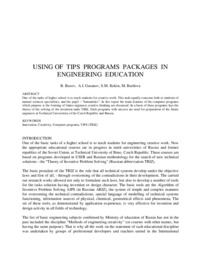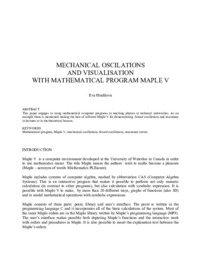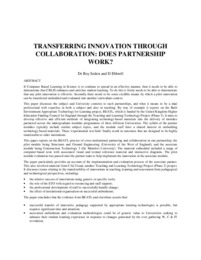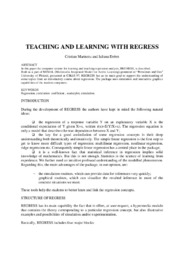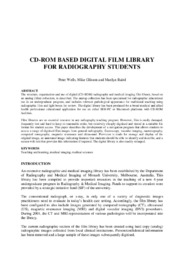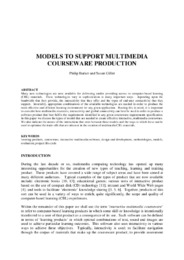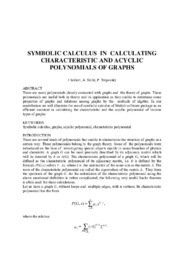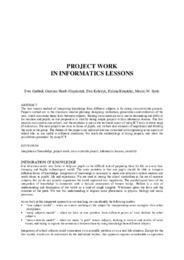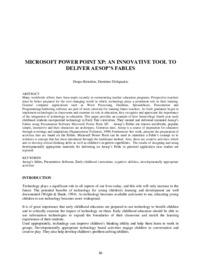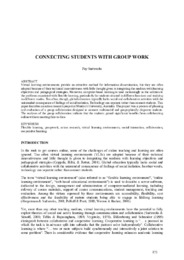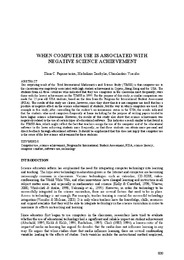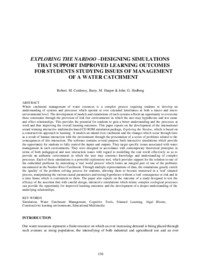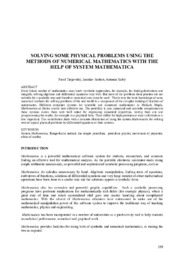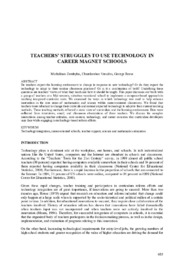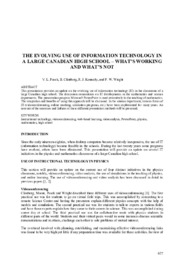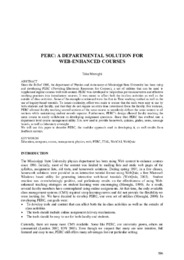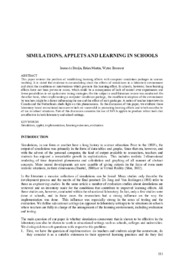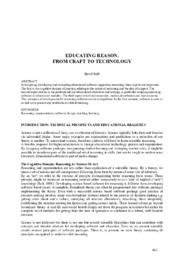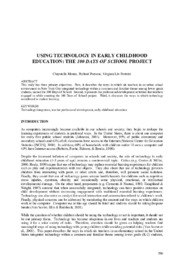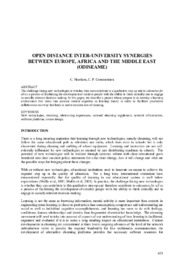Browsing Συνέδρια - Conferences by Issue Date
Now showing items 41-60 of 502
-
Using of tips programs packages in engineering education
(Pedagogical Faculty of University of Ostrava, 2001)One of the tasks of higher school is to teach students for creative work. This task equally concerns both to students of natural sciences specialities, and the pupil – “humanities”. In this report the main features of the ... -
Mechanical oscilations and visualisation with mathematical program maple v
(Pedagogical Faculty of University of Ostrava, 2001)This paper engages in using mathematical computer programs in teaching physics at technical universities. As an example there is mentioned making the best of software Maple V for demonstrating forced oscillations and ... -
Transferring innovation through Collaboration: does partnership Work?
(Pedagogical Faculty of University of Ostrava, 2001)If Computer Based Learning in Science is to continue to spread in an effective manner, then it needs to be able to demonstrate that CBLIS enhances and enriches student learning. To do this it firstly needs to be able to ... -
Teaching and learning with regress
(Pedagogical Faculty of University of Ostrava, 2001)In this paper the computer system for learning and teaching regression analysis, REGRESS, is described. Built as a part of MIMAL (Multimedia Integrated Model for Active Learning) generated at “Petroleum and Gas” University ... -
CD-ROM based digital film library for radiography students
(Pedagogical Faculty of University of Ostrava, 2001)The structure, organisation and use of digital (CD-ROM) radiography and medical imaging film library, based on an analog (film) collection, is described. The analog collection has been specialised for radiographic ... -
Models to support multimedia Courseware production
(Pedagogical Faculty of University of Ostrava, 2001)Many new technologies are now available for delivering and/or providing access to computer-based learning (CBL) materials. These technologies vary in sophistication in many important ways - depending upon the bandwidth ... -
Symbolic calculus in calculating characteristic and acyclic polynomials of graphs
(Pedagogical Faculty of University of Ostrava, 2001)There are many polynomials closely connected with graphs and the theory of graphs. These polynomials are useful both in theory and its application as they enable to determine some properties of graphs and relations among ... -
Project work in informatics lessons
(Pedagogical Faculty of University of Ostrava, 2001)The best known method of integrating knowledge from different subjects is by doing cross-curricula projects. Projects carried out in the classroom involve planning, designing, realisation, presentation and evaluation of ... -
Microsoft power point xp: an innovative tool to deliver Aesop’s fables
(Department of Educational Sciences, University of Cyprus, 2003)Many worldwide efforts have been made recently in restructuring teacher education programs. Prospective teachers must be better prepared for the ever-changing world in which, technology plays a prominent role in their ... -
Connecting students with group work
(Department of Educational Sciences, University of Cyprus, 2003)Virtual learning environments provide an attractive method for information dissemination, but they are often adopted because of their technical innovativeness with little thought given to integrating the medium with learning ... -
When computer use is associated with Negative science achievement
(Department of Educational Sciences, University of Cyprus, 2003)One surprising result of the Third International Mathematics and Science Study (TIMSS) is that computer use in the classroom was negatively associated with high student achievement in Cyprus, Hong Kong and the USA. The ... -
Exploring the nardoo –designing simulations that support improved learning outcomes for students studying issues of management of a water catchment
(Department of Educational Sciences, University of Cyprus, 2003)Whole catchment management of water resources is a complex process requiring students to develop an understanding of systems and processes which operate at over extended timeframes at both a macro and micro environmental ... -
Solving some physical problems using the methods of numerical mathematics with the help of system mathematica
(Department of Educational Sciences, University of Cyprus, 2003)Every future teacher of mathematics must know symbolic approaches, for example, for finding derivations and integrals, solving algebraic and differential equations very well. But most of the problems from practice are not ... -
Teachers’ struggles to use technology in career magnet schools
(Department of Educational Sciences, University of Cyprus, 2003)Do teachers expect the learning environment to change in response to new technology? Or do they expect the technology to adapt to their routine classroom practices? Or is it a combination of both? Underlying these questions ... -
The evolving use of information technology in a large canadian high school – what’s working and what’s not
(Department of Educational Sciences, University of Cyprus, 2003)This presentation provides an update on the evolving use of information technology (IT) in the classrooms of a large Canadian high school. The discussion concentrates on IT developments in the mathematics and science ... -
Perc: a departmental solution for web-enhanced courses
(Department of Educational Sciences, University of Cyprus, 2003)Since the Fall of 1998, the department of Physics and Astronomy at Mississippi State University has been using and developing PERC (Providing Electronic Resources for Courses), a set of utilities that can be used to ... -
Simulations, applets and learning in schools
(Department of Educational Sciences, University of Cyprus, 2003)This paper reviews the problem of establishing learning effects with computer simulation packages in science teaching. It is stated that evidence is accumulating about the effects of simulations in a laboratory environment ... -
Educating reason. From craft to technology
(Department of Educational Sciences, University of Cyprus, 2003)In designing, developing and evaluating educational software supporting reasoning, three aspects are important. The first is the cognitive domain of practice, relating to the nature of reasoning and the idea of support. ... -
Using technology in early childhood education: the 100 days of school project
(Department of Educational Sciences, University of Cyprus, 2003)This study has three primary objectives. First, it describes the ways in which six teachers in an urban school environment in New York City integrated technology within a common and familiar theme among lower grade students, ... -
Open distance inter-university synergies Between Εurope, Αfrica and the middle east (odiseame)
(Department of Educational Sciences, University of Cyprus, 2003)The challenge facing new technologies is whether they can contribute to a qualitative step up and to education for all as a process of facilitating the development of creative people with the ability to think critically ...
